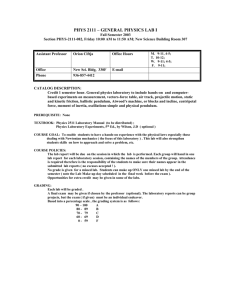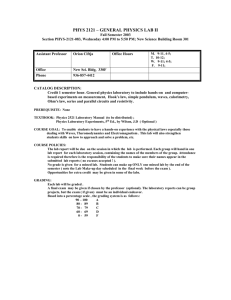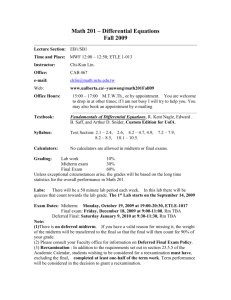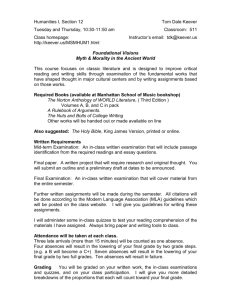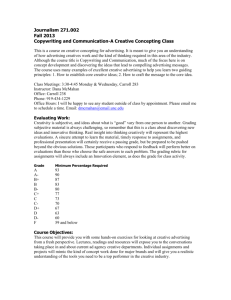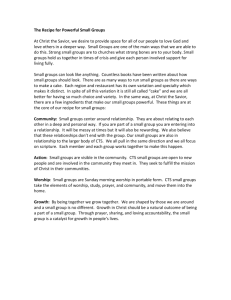231-fall-2015
advertisement
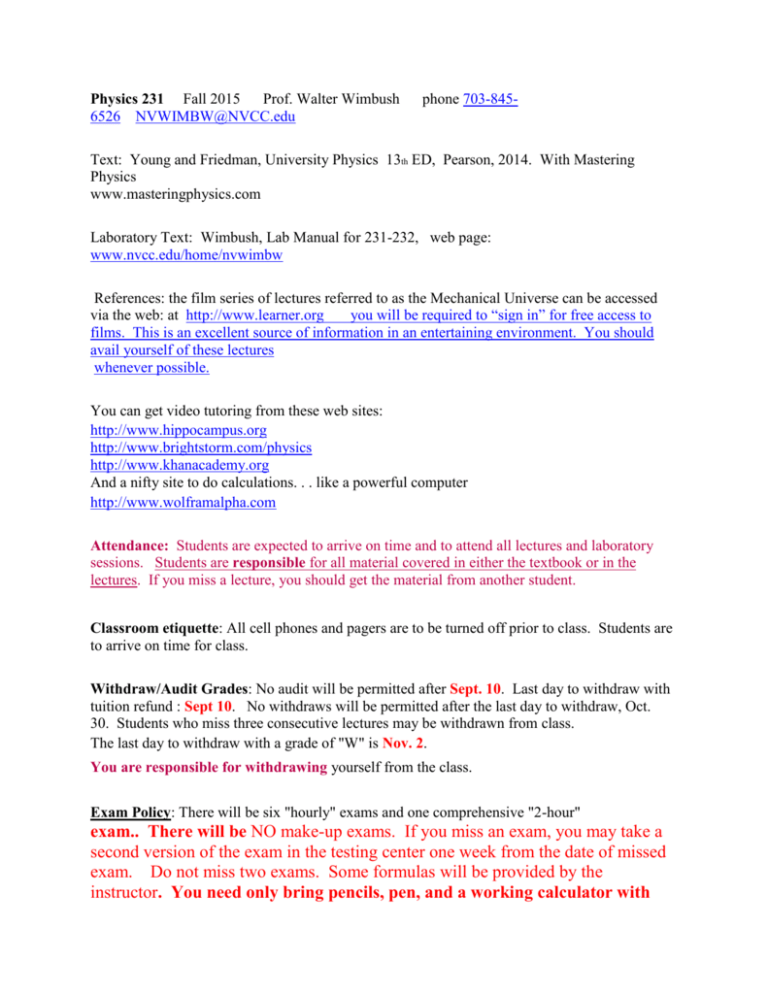
Physics 231 Fall 2015 Prof. Walter Wimbush 6526 NVWIMBW@NVCC.edu phone 703-845- Text: Young and Friedman, University Physics 13th ED, Pearson, 2014. With Mastering Physics www.masteringphysics.com Laboratory Text: Wimbush, Lab Manual for 231-232, web page: www.nvcc.edu/home/nvwimbw References: the film series of lectures referred to as the Mechanical Universe can be accessed via the web: at http://www.learner.org you will be required to “sign in” for free access to films. This is an excellent source of information in an entertaining environment. You should avail yourself of these lectures whenever possible. You can get video tutoring from these web sites: http://www.hippocampus.org http://www.brightstorm.com/physics http://www.khanacademy.org And a nifty site to do calculations. . . like a powerful computer http://www.wolframalpha.com Attendance: Students are expected to arrive on time and to attend all lectures and laboratory sessions. Students are responsible for all material covered in either the textbook or in the lectures. If you miss a lecture, you should get the material from another student. Classroom etiquette: All cell phones and pagers are to be turned off prior to class. Students are to arrive on time for class. Withdraw/Audit Grades: No audit will be permitted after Sept. 10. Last day to withdraw with tuition refund : Sept 10. No withdraws will be permitted after the last day to withdraw, Oct. 30. Students who miss three consecutive lectures may be withdrawn from class. The last day to withdraw with a grade of "W" is Nov. 2. You are responsible for withdrawing yourself from the class. Exam Policy: There will be six "hourly" exams and one comprehensive "2-hour" exam.. There will be NO make-up exams. If you miss an exam, you may take a second version of the exam in the testing center one week from the date of missed exam. Do not miss two exams. Some formulas will be provided by the instructor. You need only bring pencils, pen, and a working calculator with you to the examination. Any indication of cheating will result in a grade of zero for the exam. The second episode of cheating will result in a grade of “F” for the course. Grading Policy: A = 90 - 100% B = 80 - 89% C = 70 - 79% D = 60 - 69% Final % = 65%(lect.) + 20%(lab) + 15%(homework) Comprehensive final 150 pts Exams 400 pts Lab 150 pts Special Needs and Accommodations: Please notify the instructor of any special problems or needs at the beginning of the semester. If you are seeking accommodations based on a disability, you must provide a disability data sheet, which can be obtained from the counselor for special needs, who is located in Room 148 of the Bisdorf Building, telephone number 845-6301. The Academic Center for Excellence (ACE) and the Academic Center for Reading and Writing (ACRW) provide free peer tutoring and reading and writing assistance. ACE and ACRW are located in AA229. For more information or to schedule an appointment, stop by (AA229), call them (703.845.6363), or visit them online: http://www.nvcc.edu/campuses-and-centers/alexandria/campus-resources/academicsupport/index.html. Lecture Schedule: No class on following days: Sept. 8, Oct. 12-13 Nov. 25-30 Monday Aug. 24 Ch. 1: Vectors HW 1: 1.4, 1.11, 1.15, 1.23, 1.31, 1.35, 1.45, 1.47, 1.58, 1.68, 1.101 Wednesday Aug. 26 Ch. 2: Motion 1-D HW 2: 2.8, 2.22, 2.28, 2.39, 2.44, 2.53, 2.54, 2.59,2.64, 2.80, LAB: Uniform Acceleration Aug 31 cH: 3: motion 2&3 Dim HW 3: 3.4, 3.8, 3.16, 3.27, 3.29, 3.35, 3.36, 3.47, 3.84, 3.87 Sept 2 Ch. 4: Force Hw 4: 4.2, 4.7, 4.10, 4.19, 4.23, 4.28, 4.38, 4.39, 4.54, 4.58 Lab: Addition of Vectors Sept. 9 Exam 1 Kinematics and Vectors ch. 1,2,3 Lab: Newton’s Second Law Sept 14 Ch 5: Using Newton’s Laws Hw 5: 5.8, 5.15, 5.34, 5.42, 5.46, 5.72, 5.73, 5.92, 5.98, 5.119 Sept. 16 Uniform circular motion Lab: centripetal force (Goggles) Sept 21 Exam II – Ch. 4 – 5 Sept 23, Ch. 6: Work Kinetic Energy HW 6: 6.3, 6.8, 6.15, 6.33, 6.37, 6.56, 6.74, 6.76, 6.85, 6.99 Lab: conservation of energy Sept 28 Ch. 7: Potential energy, HW 7: 7.4, 7.9, 7.10, 7.11, 7.16, 7.23, 7.30, 7.35, 7.36, 7.39, 7.45, 7.51, 7.55, 7.63 Sept 30 Ch. 7: conservation of energy Lab conservation of momentum Oct. 5 Ch. 8: Momentum & collisions HW 8: 8.7, 8.8, 8.13, 8.21, 8.29, 8.36, 8.41, 8.42, 8.44, 8.47, 8.49, 8.51, 8.53, 8.62, 8.106 Oct 7 Exam III – Ch. 6 – 8 Lab: Conservation of Momentum 2 - dimensions Oct 12 day off Oct 14 Ch. 9: Rotation HW 9:9.3, 9.4, 9.7, 9.11, 9.15, 9.18, 9.24, 9.30, 9.34, 9.49, 9.60, 9.61, 9.84, 9.95 Lab: Moment of Inertia (lab GOGGLES) Oct 19 Ch. 10 Rotational Dynamics HW 10: 10.3, 10.10, 10.27, 10.33, 10.37, 10.43, 10.46, 10.49, 10.57, 10.70, 10.76 Oct 21 Ch 11: Equilibrium & Elasticity HW 11: 11.11, 11.13, 11.19, 11.31, 11.40, 11.53, 11.56, 11.76, 11.79, 11.2 Lab: Torques Oct 26 Exam IV - Ch. 9 – 11 Oct 28 Ch 12: Fluids HW 12: 12.4, 12.11, 12.31, 12.35, 12.44, 12.59, 12.74, 12.90 Nov 2 Nov 4 Gravitation Hw 13:13.5, 13.19, 13.26, 13.32, 13.57, 13.59, 13.71 Ch. 14: Periodic Motion 14.40, 14.45, 14.57, 14.60, 14.94 Lab: Simple Harmonic Motion HW 14: 14.4, 14.7, 14.11, 14.19, 14.21, 14.27, 14.36, Nov 9 Ch. 14: Periodic Motion Nov 11 Ch. 14 Exam IV Ch 12-14 Nov 16 Ch. 17 Temperature & Heat Hw 17: 17.2, 17.8, 17.11, 17.14, 17.26, 17.30, 17.38, 17.41, 17.51, 17.62, 17.67, 17.75, 17.85 Lab: Ideal Gas Law Nov 18 Ch 18 Thermal Properties Hw 18: 18.1, 18.7, 18.12, 18.32, 18.38, 18.41, 18.47, 18.51 Nov 23 ch. 19 first law of thermodynamics hw 19: 19.1, 19.3, 19.5, 19.8, 19.21, 19.31, 19.39, 19.41 Lab: Specific Heat Capacity Lab: Latent heat (lab GOGGLES) Nov 25 THANKSGIVING HOLIDAY Nov 30 Ch. 20: 2nd Law Thermodynamics HW 20: 20.1, 20.5, 20.9, 20.13, 20.23, 20.33 Dec 2 Ch. 20 Dec 7 Review for Final Dec 9 Lab: Gas Laws (lab GOGGLES) Dec 14 Final Exam LABORATORY The lab report should include: 1. Abstract: A brief statement of what the experiment "proves" and the validity of the method or procedures used. 2. Theory: Derive the formulas used in the experiment. 3. A labeled diagram of the apparatus. (labels in ink artwork in pencil) 4. procedure:Should be written in 3rd person, passive voice, past tense example: The thermometer was read in three minute intervals and the value recorded in table II. (do not write “I read the thermometer” or “read the thermometer every three minutes.”) 5. Data tables: (data in pencil; labels and lines separating columns and rows in ink) Graphs: (labels, scales for x- and y - axis: in ink , curve in pencil) Best done on Excel 6. Determination of experimental Error. 7. Conclusion: Laboratory Schedule All safety regulations will be enforced! You will be responsible for purchasing you own safety goggles and having them in class. Sandals will not be permitted in the laboratory. Anyone not obeying these rules will be told to leave the lab. You will forfeit the credit for that lab.!!! You will turn in data sheets complete with calculations (excel is available on the computers). Use Microsoft word to include a statement of the purpose, theory, procedure and a conclusion summary with your data sheets. You must indicate all of your lab partners on the report! Date Experiment Experiment #1 :Density Uniformly Accelerated Motion Addition and Resolution of Vectors Newton's Second Law Centripetal Force Goggles are required Linear Momentum or Ballistic Pendulum Torque Moment of Inertia 2-dimensional collisions Conservation of Energy ?? for newton's second law: measure air friction due to different shaped objects attached tothe glider. for moment of inertia: use the digital apparatus measure angular momentum conservation of angular momentum etc. for pendulum measure: measure damping Hooke's law and Simple Harmonic Motion Gas Laws Goggles are required Specific heat and latent heat Goggles are required Each group will turn in a data sheet with calculations at the end of each lab to be checked by the instructor. Then, each individual will take a small quiz on the lab, its calculations, its conclusions, and its methodology. There will two lab reports, which will be done independently and submitted one week after the lab. Instructions for Completing Laboratory Reports During an experiment you are to record your data in a laboratory notebook. This notebook contains the actual measurements and preliminary calculations and must be handed in at the end of the semester. One week from the day of performing the experiment you are to hand in a laboratory report. For most of the experiments the report is an informal laboratory report, but for two reports will be formal laboratory reports. A. Informal report. This report should begin with a description of the principle or phenomena that was investigated during the experiment. It should include a labeled diagram of the apparatus. It should include the data, a sample calculation, tables, and graphs. It should end with a conclusion which is a statement describing what principles or phenomena that was actually verified by the data. B. Formal report: (This report is to be typed) A sample lab report can be found on my web page. The report should contain: ***On the First Page*** Your Name Title of Experiment Date of performing experiment Names of lab partners 1. Abstract: A brief description of the experiment and the results obtained. (approximately 4 or 5 sentences). State your Hypothesis and how you intend to “prove it” with his procedure. ***On the remaining Pages*** 1. Introduction: Description of the Principle, Law, or phenomena under investigation; this should include any derivation of mathematical formula used. 2. Labeled Diagram of apparatus 3. Procedure: Describe the experimental method and discuss how the procedure corrected measured what was stated, and how these measurements support the theory. (a statement of what was done during the experiment, use the third person, passive voice, past tense…”The air tract was leveled by adjusting the screws until the glider did not slide down the track.” 4. Results. Make a clear connection between your data and the intended principle being verified. All tables must have titles and all graphs must have captions. 5. Conclusion: Discuss the how the data in your experiment verifies the physical principle. 6. References. If you use any textbooks or reference books or web pages while writing your report, please cite them, and include a bibliography at the end.


